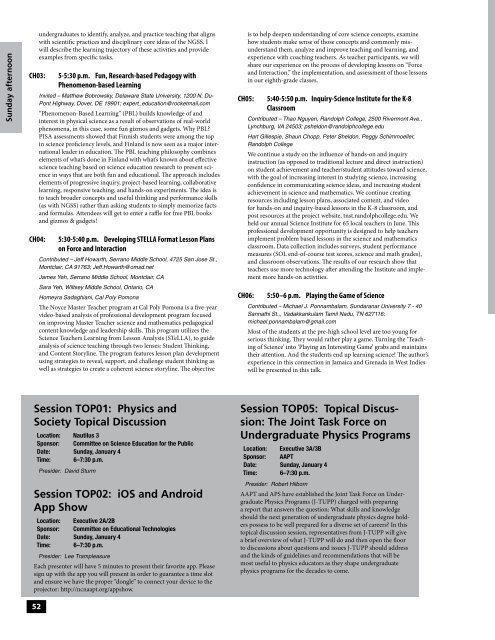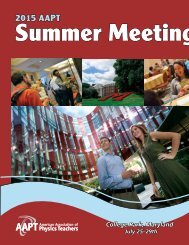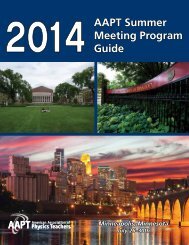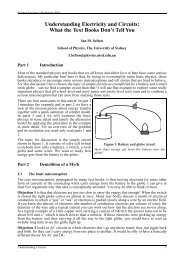final-program-12-23-14-3
final-program-12-23-14-3
final-program-12-23-14-3
You also want an ePaper? Increase the reach of your titles
YUMPU automatically turns print PDFs into web optimized ePapers that Google loves.
Sunday afternoon<br />
undergraduates to identify, analyze, and practice teaching that aligns<br />
with scientific practices and disciplinary core ideas of the NGSS. I<br />
will describe the learning trajectory of these activities and provide<br />
examples from specific tasks.<br />
CH03: 5-5:30 p.m. Fun, Research-based Pedagogy with<br />
Phenomenon-based Learning<br />
Invited – Matthew Bobrowsky, Delaware State University, <strong>12</strong>00 N. Du-<br />
Pont Highway, Dover, DE 19901; expert_education@rocketmail.com<br />
“Phenomenon-Based Learning” (PBL) builds knowledge of and<br />
interest in physical science as a result of observations of real-world<br />
phenomena, in this case, some fun gizmos and gadgets. Why PBL<br />
PISA assessments showed that Finnish students were among the top<br />
in science proficiency levels, and Finland is now seen as a major international<br />
leader in education. The PBL teaching philosophy combines<br />
elements of what’s done in Finland with what’s known about effective<br />
science teaching based on science education research to present science<br />
in ways that are both fun and educational. The approach includes<br />
elements of progressive inquiry, project-based learning, collaborative<br />
learning, responsive teaching, and hands-on experiments. The idea is<br />
to teach broader concepts and useful thinking and performance skills<br />
(as with NGSS) rather than asking students to simply memorize facts<br />
and formulas. Attendees will get to enter a raffle for free PBL books<br />
and gizmos & gadgets!<br />
CH04: 5:30-5:40 p.m. Developing STELLA Format Lesson Plans<br />
on Force and Interaction<br />
Contributed – Jeff Howarth, Serrano Middle School, 4725 San Jose St.,<br />
Montclair, CA 91763; Jeff.Howarth@omsd.net<br />
James Yeh, Serrano Middle School, Montclair, CA<br />
Sara Yeh, Wiltsey Middle School, Ontario, CA<br />
Homeyra Sadaghiani, Cal Poly Pomona<br />
The Noyce Master Teacher <strong>program</strong> at Cal Poly Pomona is a five-year<br />
video-based analysis of professional development <strong>program</strong> focused<br />
on improving Master Teacher science and mathematics pedagogical<br />
content knowledge and leadership skills. This <strong>program</strong> utilizes the<br />
Science Teachers Learning from Lesson Analysis (STeLLA), to guide<br />
analysis of science teaching through two lenses: Student Thinking,<br />
and Content Storyline. The <strong>program</strong> features lesson plan development<br />
using strategies to reveal, support, and challenge student thinking as<br />
well as strategies to create a coherent science storyline. The objective<br />
is to help deepen understanding of core science concepts, examine<br />
how students make sense of those concepts and commonly misunderstand<br />
them, analyze and improve teaching and learning, and<br />
experience with coaching teachers. As teacher participants, we will<br />
share our experience on the process of developing lessons on “Force<br />
and Interaction,” the implementation, and assessment of those lessons<br />
in our eighth-grade classes.<br />
CH05: 5:40-5:50 p.m. Inquiry-Science Institute for the K-8<br />
Classroom<br />
Contributed – Thao Nguyen, Randolph College, 2500 Rivermont Ave.,<br />
Lynchburg, VA 24503; psheldon@randolphcollege.edu<br />
Hart Gillespie, Shaun Chopp, Peter Sheldon, Peggy Schimmoeller,<br />
Randolph College<br />
We continue a study on the influence of hands-on and inquiry<br />
instruction (as opposed to traditional lecture and direct instruction)<br />
on student achievement and teacher/student attitudes toward science,<br />
with the goal of increasing interest in studying science, increasing<br />
confidence in communicating science ideas, and increasing student<br />
achievement in science and mathematics. We continue creating<br />
resources including lesson plans, associated content, and video<br />
for hands-on and inquiry-based lessons in the K-8 classroom, and<br />
post resources at the project website, tnst.randolphcollege.edu. We<br />
held our annual Science Institute for 65 local teachers in June. This<br />
professional development opportunity is designed to help teachers<br />
implement problem based lessons in the science and mathematics<br />
classroom. Data collection includes surveys, student performance<br />
measures (SOL end-of-course test scores, science and math grades),<br />
and classroom observations. The results of our research show that<br />
teachers use more technology after attending the Institute and implement<br />
more hands-on activities.<br />
CH06:<br />
5:50–6 p.m. Playing the Game of Science<br />
Contributed – Michael J. Ponnambalam, Sundaranar University 7 - 40<br />
Sannathi St.,, Vadakkankulam Tamil Nadu, TN 627116;<br />
michael.ponnambalam@gmail.com<br />
Most of the students at the pre-high school level are too young for<br />
serious thinking. They would rather play a game. Turning the ‘Teaching<br />
of Science’ into ‘Playing an Interesting Game’ grabs and maintains<br />
their attention. And the students end up learning science! The author’s<br />
experience in this connection in Jamaica and Grenada in West Indies<br />
will be presented in this talk.<br />
Session TOP01: Physics and<br />
Society Topical Discussion<br />
Location: Nautilus 3<br />
Sponsor: Committee on Science Education for the Public<br />
Date: Sunday, January 4<br />
Time: 6–7:30 p.m.<br />
52<br />
Presider: David Sturm<br />
Session TOP02: iOS and Android<br />
App Show<br />
Location: Executive 2A/2B<br />
Sponsor: Committee on Educational Technologies<br />
Date: Sunday, January 4<br />
Time: 6–7:30 p.m.<br />
Presider: Lee Trampleasure<br />
Each presenter will have 5 minutes to present their favorite app. Please<br />
sign up with the app you will present in order to guarantee a time slot<br />
and ensure we have the proper “dongle” to connect your device to the<br />
projector: http://ncnaapt.org/appshow.<br />
Session TOP05: Topical Discussion:<br />
The Joint Task Force on<br />
Undergraduate Physics Programs<br />
Location: Executive 3A/3B<br />
Sponsor: AAPT<br />
Date: Sunday, January 4<br />
Time: 6–7:30 p.m.<br />
Presider: Robert Hilborn<br />
AAPT and APS have established the Joint Task Force on Undergraduate<br />
Physics Programs (J-TUPP) charged with preparing<br />
a report that answers the question: What skills and knowledge<br />
should the next generation of undergraduate physics degree holders<br />
possess to be well prepared for a diverse set of careers In this<br />
topical discussion session, representatives from J-TUPP will give<br />
a brief overview of what J-TUPP will do and then open the floor<br />
to discussions about questions and issues J-TUPP should address<br />
and the kinds of guidelines and recommendations that will be<br />
most useful to physics educators as they shape undergraduate<br />
physics <strong>program</strong>s for the decades to come.






